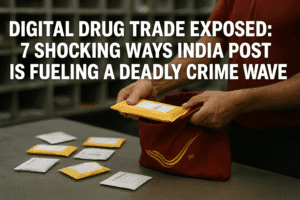Digital Drug Trade Exposed: 7 Shocking Ways India Post Is Fueling a Deadly Crime Wave
India’s postal service has become an unwitting highway for a sophisticated digital drug trade, as revealed by the dismantling of ‘Ketamelon’ – the country’s largest darknet narcotics operation. Run by a discreet Kerala engineer, the empire exploited India Post’s vast network to distribute LSD and ketamine nationwide, disguised as ordinary parcels. Payments flowed through untraceable Monero cryptocurrency, enabling a multi-million rupee business with e-commerce efficiency, including customer ratings and bulk discounts.
Despite high-tech anonymity tools, authorities traced the operation through real-world slip-ups in crypto cash-outs and shipment patterns. This case exposes a glaring loophole: once contraband enters India, minimal parcel checks allow criminals to weaponize public mail infrastructure. While law enforcement adapts, the absence of systemic scanning and KYC enforcement at post offices leaves critical vulnerabilities unaddressed. Ultimately, the trusted institution delivering pensions and letters now inadvertently fuels an epidemic, demanding urgent reform to protect its integrity.

Digital Drug Trade Exposed: 7 Shocking Ways India Post Is Fueling a Deadly Crime Wave
In the quiet suburbs of Muvattupuzha, Kerala, Edison Babu lived an unassuming life—until authorities uncovered his double identity as the mastermind behind Ketamelon, India’s most sophisticated darknet drug empire. His operation, which leveraged the government’s postal service to distribute narcotics nationwide, exposes a glaring vulnerability in India’s logistics infrastructure—one that criminals are exploiting with alarming efficiency.
The Darknet’s Amazon of Drugs
Babu’s Ketamelon wasn’t just another illicit marketplace; it was a meticulously organized digital drug bazaar with customer ratings, bulk discounts, and prompt deliveries. Operating as a level-4 vendor—the darknet equivalent of an Amazon Prime seller—he sourced high-quality synthetic drugs like LSD and ketamine from international suppliers, repackaged them, and dispatched them via India Post.
The scale of his operation was staggering: over 600 shipments in 18 months, with monthly sales reaching an estimated 10,000 LSD blots (priced at ₹2,500–₹4,000 each). Payments were funneled through Monero, a cryptocurrency designed for untraceable transactions, making financial tracking nearly impossible for authorities.
How the Postal System Became a Drug Highway
India Post, a trusted institution connecting even the remotest corners of the country, has unwittingly become the backbone of this shadow economy. Unlike private couriers, which often enforce stricter KYC norms, the postal service lacks robust screening for domestic parcels.
An NCB official revealed the shocking reality: “Once contraband enters India, there’s virtually no protocol for scanning or verifying parcels. A person could send a pistol from Kochi to Delhi without detection.”
Babu’s routine visits to his local post office—disguised as a small business owner—highlighted this systemic flaw. With no mandatory checks, drug traffickers exploit the anonymity and reach of government mail to operate undetected.
The Rise of India’s Digital Drug Lords
Babu is not an outlier. In recent years, authorities have dismantled multiple darknet drug rings with names mimicking legitimate businesses:
- Rambada Cartel (2023) – Distributed LSD and MDMA nationwide.
- Tile Shop (2023) – Operated as a pseudo-e-commerce platform for narcotics.
- Hare Krishna (2024) – Used a spiritual alias to mask a sprawling drug network.
These cases reveal a troubling trend: tech-savvy individuals, often with backgrounds in cryptocurrency trading, are pivoting to darknet drug sales for higher profits. Many start as users before realizing the lucrative potential of becoming vendors.
The Cat-and-Mouse Game with Law Enforcement
While the darknet offers near-perfect anonymity, investigators exploit real-world slip-ups:
- Cryptocurrency Leaks – Despite Monero’s privacy features, converting crypto to cash leaves traces in bank records.
- Postal Patterns – Authorities monitor neighborhoods with abnormal foreign shipment volumes.
- Supplier Links – International courier intercepts (like Babu’s UK-based supplier Gunga Din) help trace networks.
Yet, the NCB admits the biggest challenge remains the lack of systemic checks in India’s postal system. While they’ve pushed for Aadhaar-based parcel tracking and stricter KYC, enforcement remains inconsistent.
A Call for Systemic Reform
The Ketamelon case underscores an urgent need for:
- Mandatory Scans – Domestic parcels, especially high-volume senders, should undergo random checks.
- Postal Employee Training – Awareness programs to spot suspicious packages.
- Blockchain Monitoring – Collaboration with crypto exchanges to flag large, suspicious transactions.
As digital drug markets evolve, so must the mechanisms to combat them. The irony is stark: the same system meant to serve the public is being weaponized against it. Until India Post and law enforcement close these gaps, the country’s postal service will remain a silent accomplice in the drug trade—one package at a time.
Final Thought:
In an age where convenience drives commerce, criminals have learned to exploit trust—whether in technology or public institutions. The real battle isn’t just against drugs; it’s against systemic vulnerabilities that allow them to flourish in plain sight.
You must be logged in to post a comment.